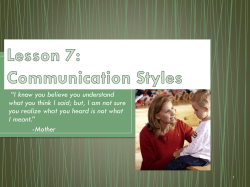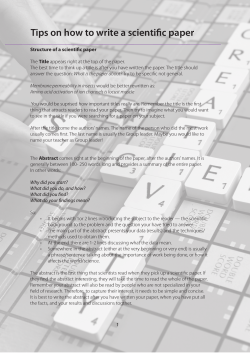
Body Speak Lise Fuller www.lisefuller.com www.dangerzoneauthors.com
Body Speak Lise Fuller www.lisefuller.com www.dangerzoneauthors.com How good are your reading skills? • The Test (from www.lifescript.com) ~ You're back in high school, and it's three hours past your curfew. You slink back into the house and your mom's standing in the living room. Her crossed arms and tensed jaw tell you how upset she is. The days of high school may be long gone, but the ability to read between people's words is a skill that you'll need for the rest of your life. Even when you're silent, your body is sending signals about your mood and thoughts. Do you know what kind of signals you're sending? Find out now. How good are your reading skills? • Answers • Remember ~ – Look at WHOLE body & view in context – Look for congruence in words & action – People react based on experiences, enculturation, biology, belief systems and what they know or think they know about you—as well as how you react to them What we’ll look at today • Non-verbal basics • Writing the non-verbal • Applying non-verbal cues to your writing Non-verbal basics • Various studies show over 50% (some even say 90%) of face-to-face communication is non-verbal ◄Paralanguage ►Kinesics Non-verbal basics • For the writer ~ • Hardwired & Sex • Reading the five senses • Enculturation • Across the ages Hardwired & sex • Some gestures, esp. facial, are universal across cultures, suggesting that this is part of our DNA • Emotion may reside in cells • Cause & Effect • Men & woman are programmed differently to express emotions & actions Reading the five senses • • • • • Sight Sound Touch Taste Smell Enculturation • Some non verbal is cultural. Some examples include: – – – – Hand signs Handshakes Proximity to others Use of gestures while speaking – Touching – Eye contact Across the ages • Different non-verbal signals were used in different times. DO YOUR RESEARCH! • Examples: – – – – Use of fan by women Batting of lashes by women Kiss of the hand Roman handshake (they grabbed each other’s wrists) – Bowing – Pace of walking Writing the non-verbal • Makes story more tactile, more real • Use for putting reader into character’s heads/emotions • Use to move story forward • Use to enrich character interactions • Use as character tags • Use power words & phrases • What others can you think of? Writing the non-verbal • Examples & Analysis Applying non-verbal cues • Exercises – Reworking the masters – Your MS Exercise #1 “Their bearing, though not entirely composed, was full of a dignified and submissive indifference which excited the admiration of D’Artagnan….” “[M. de Traville] stopped all at once full in front of them, and looking angrily from head to foot– “‘Do you know what the king said to me,’ cried he, “…do you know…?” ‘“No,” replied the two musketeers, after a moments silence; “no, sir, we do not.” ‘“But I hope that you will do us the honor to tell us,” added Aramis, in his politest tone, and with the most graceful bow. ~ From The Three Musketeers by Alexandre Dumas Exercise #2 Then the queen with a look of hatred, gave a shrill laugh and cried, “White as snow, red as blood, and black as ebony! This time the dwarfs will not be able to wake you again!” And when she reached home she asked: “Mirror, mirror on the wall, Who is the fairest one of all?” And the mirror answered at last: “Queen, you are the fairest of them all.” Then her jealous heart at last had peace; that is, as far as a jealous hateful heart can have peace. Exercise #3 ~ Your Manuscript ~ The Next Bestseller References to look for • Major news sources, including local papers. (I used CNN online and articles from the Colorado Springs Gazette for this presentation.) • Dimitrius, Jo-Ellan & Mazarella, Mark. Reading People: How to Understand People and Predict Their Behavior—Anytime, Anyplace. Ballantine Books, 1999. • New Scientist. “Pulling a Face Alters Sensory Perception.” http://www.newscientist.com/article/mg19826614.600-pulling-a-facealters-sensory-perception.html. Also check out other articles at www.newscientist.com using search mode. • Pease, Allan & Barbara. The Definitive Book of Body Language. New York, NY. Bantam Dell, 2004. • Rodriguez, Larry, M.S. www.learnbodylanguage.org. • Sifianou, Maria. Politeness Phenomena in England & Greece-A Cross Cultural Perspective. Oxford University Press, 1999 • Web MD. “Body Language Basics.” http://www.webmd.com/sexrelationships/features/body-language-basics • Wood, Patti. Success Signals: A Guide to Reading Body Language. Also check out her website: http://www.pattiwood.net/ .
© Copyright 2025












